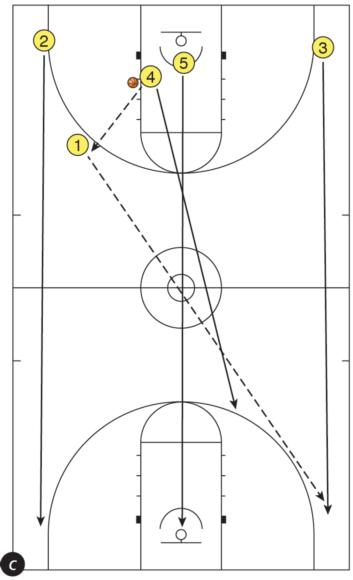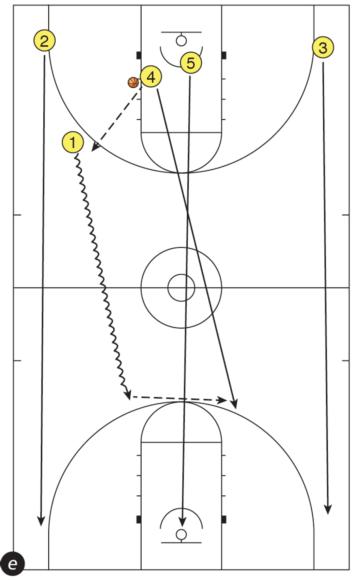Team Offense
This is an excerpt from Basketball Essentials by Ryan Goodson.
The offensive team should be looking for quick and easy scoring opportunities before the opponent has a chance to retreat and set up their defense. These high-percentage early scoring opportunities are called fast breaks or primary breaks.
Fast Break
Most disciplined teams are taught how to properly run the floor to facilitate these quick and easy points. As shown in figure 8.10, each player has a specific responsibility on the fast break. In addition to these responsibilities, keep in mind that it is the job of every player to sprint the floor, maintain proper spacing, and communicate. The 4 and 5 positions are interchangeable, as are the 2 and 3 positions. The job of the 4 and 5 positions is first to rebound the basketball. If player 4 obtains the rebound, player 5 immediately sprints up the middle of the court and seals their defender at the front of the rim. Player 4 looks to quickly pass the basketball to the position 1 guard. As this is happening, players 2 and 3 run wide near the sideline until they reach the corner of the court where the baseline meets the sideline. The purpose of running wide up the sideline is to create more space between each offensive player, thus making the defense's job much tougher. The position 1 guard tries to make a hit-ahead pass to player 2, 3, or 5 for the open inside or outside shot, or player 1 can dribble up the court if none of these options are open. Player 4 finishes out the break by trailing behind to the weak side of the court. With the fast break, time is of the essence. It is faster to advance the basketball with a pass than with the dribble. If the advantage is there, look to score quickly by passing the basketball up the floor and finding the open player. The more time it takes, the more likely it is that the defense will recover. The fast break lanes in the following diagrams are an important part of the strategy for creating space and open scoring opportunities, and they should be implemented after every defensive rebound and after any quick change of possession.
Primary Break Drill
Breakdown
 |
 |
 |
 |
 |
Setup
Primary break drill.
- Use five players and one basketball.
- All five players are lined up across the baseline.
- As soon as everyone is in place, the coach takes a shot.
- Player 4 rebounds the basketball and makes a pass to player 1. Player 4 then runs the floor to the opposite three-point arc.
- Player 1 advances the basketball up the court either by pass or dribble.
- Players 2 and 3 run wide and up each sideline to the corner and outside the three-point line.
- Player 5 runs directly to the rim and looks for the basketball and an easy basket.
Execution
- When the shot goes up, player 4 retrieves the rebound and outlet passes to player 1. At the same time, players 2 and 3 sprint wide up the sidelines and player 5 sprints up the middle of the court and toward the rim (figure8.10a).
- During the first trip up the court, player 1 will pass ahead to player 5 for the layup. After each made shot, the drill will reset and each player will line up across the baseline again and wait for the coach to shoot the basketball.
- The second option is to pass ahead to player 2 for the perimeter shot or drive (figure 8.10b).
- The third option is to pass ahead to player 3 for the perimeter shot or drive (figure 8.10c).
- The fourth option is for player 1 to dribble up the court and attack toward the basket for a layup (figure 8.10d).
- The fifth option is for player 1 to dribble up the court and then pass to player 4, who is trailing the break, for the jump shot (figure8.10e).
- Players complete all five options to finish the drill.
Coaching Point
Each player should be sprinting as fast they can. To elevate the drill and to hold each player accountable, I often time the drill. Players must complete all five options within a certain time period.
Learn more about Basketball Essentials.
More Excerpts From Basketball EssentialsSHOP

Get the latest insights with regular newsletters, plus periodic product information and special insider offers.
JOIN NOW


